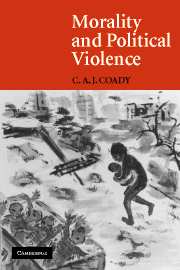Book contents
- Frontmatter
- Contents
- Preface
- Morality and Political Violence
- 1 Staring at Armageddon
- 2 The Idea of Violence
- 3 Violence and Justice
- 4 Aggression, Defence, and Just Cause
- 5 Justice with Prudence
- 6 The Right Way to Fight
- 7 The Problem of Collateral Damage
- 8 The Morality of Terrorism
- 9 The Immunities of Combatants
- 10 Morality and the Mercenary Warrior
- 11 Objecting Morally
- 12 Weapons of Mass Destruction
- 13 The Ideal of Peace
- 14 The Issue of Stringency
- Bibliography
- Index
3 - Violence and Justice
Published online by Cambridge University Press: 05 June 2012
- Frontmatter
- Contents
- Preface
- Morality and Political Violence
- 1 Staring at Armageddon
- 2 The Idea of Violence
- 3 Violence and Justice
- 4 Aggression, Defence, and Just Cause
- 5 Justice with Prudence
- 6 The Right Way to Fight
- 7 The Problem of Collateral Damage
- 8 The Morality of Terrorism
- 9 The Immunities of Combatants
- 10 Morality and the Mercenary Warrior
- 11 Objecting Morally
- 12 Weapons of Mass Destruction
- 13 The Ideal of Peace
- 14 The Issue of Stringency
- Bibliography
- Index
Summary
War is waged by men; not by beasts, or by gods. It is a peculiarly human activity. To call it a crime against humanity is to miss at least half its significance; it is also the punishment of a crime. That raises a moral question, the kind of problem with which the present age is disinclined to deal.
Frederick ManningWe have been discussing the nature of violence, and it is time to turn more directly to its moral assessment. Thomas Hobbes argued persuasively that the problem of violence lies at the heart of civil society. Hobbes thought that violence was endemic to human life and that in pre-civil or noncivil conditions (his “state of nature”) it created such miseries that reason required men to alienate, almost entirely, their natural right to self-protection in order to set up a sovereign with the sole right of the sword. In Hobbes's vision, the natural desire for self-preservation, and the peace that ensures it, will enable people to live together in security so long as they can be certain that there are workable violent sanctions to restrain and control those who break the peace or are tempted to do so. The solution to the awful problem posed by the widespread violence of the state of nature is to monopolise the potentiality for violence in the one agency.
There are many problems with Hobbes's picture of civil society and its title to legitimacy, just as there are many problems with his theory of human nature.
- Type
- Chapter
- Information
- Morality and Political Violence , pp. 43 - 67Publisher: Cambridge University PressPrint publication year: 2007



